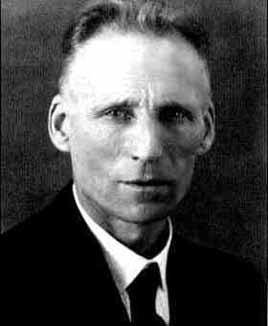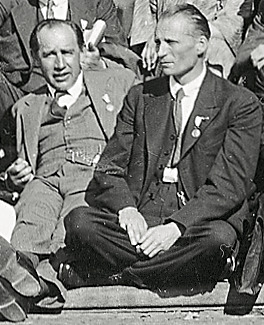L. E. J. Brouwer facts for kids
Quick facts for kids
L. E. J. Brouwer
|
|
|---|---|
 |
|
| Born |
Luitzen Egbertus Jan Brouwer
27 February 1881 Overschie, Netherlands
|
| Died | 2 December 1966 (aged 85) |
| Nationality | Dutch |
| Alma mater | University of Amsterdam |
| Known for | Brouwer–Hilbert controversy Brouwer fixed-point theorem Brouwer–Heyting–Kolmogorov interpretation Jordan-Brouwer separation theorem Kleene–Brouwer order Phragmen–Brouwer theorem Tietze-Urysohn-Brouwer extension theorem Simplicial approximation theorem Bar induction Degree of a continuous mapping Indecomposability Invariance of domain Spread Proving hairy ball theorem Intuitionism |
| Awards | Foreign Member of the Royal Society |
| Scientific career | |
| Fields | Mathematics |
| Institutions | University of Amsterdam |
| Doctoral advisor | Diederik Korteweg |
| Doctoral students | Arend Heyting |
| Influences | Immanuel Kant Arthur Schopenhauer |
| Influenced | Hermann Weyl Michael Dummett Ludwig Wittgenstein |
Luitzen Egbertus Jan Brouwer (born February 27, 1881 – died December 2, 1966) was a famous Dutch mathematician and philosopher. People often call him L. E. J. Brouwer, but his friends knew him as Bertus. He made big contributions to areas of math like topology and set theory.
Brouwer is known as the founder of modern topology. This is a branch of mathematics that studies shapes and spaces. He developed important ideas like his fixed-point theorem. This theorem says that if you continuously map a shape to itself in a certain way, at least one point will stay in its original place. Imagine stirring a cup of coffee; there's always one point that ends up exactly where it started!
He also became a key figure in the philosophy of intuitionism. This idea suggests that math is something we build in our minds. It's not just a set of truths that exist out there. This view led to a famous disagreement with another mathematician, David Hilbert. This was called the Brouwer–Hilbert controversy. Brouwer's ideas later influenced other mathematicians, including his student Arend Heyting.
Contents
Early Life and Discoveries
Brouwer was born in Overschie, Netherlands. From a young age, he showed a deep interest in mathematics. He studied at the University of Amsterdam.
Early in his career, Brouwer proved many important theorems in topology. These included his famous fixed-point theorem. This theorem is widely used in many areas of math and science. It helps us understand how certain systems behave.
He also proved the simplicial approximation theorem. This theorem helps mathematicians study complex shapes by breaking them down into simpler pieces. In 1912, when he was 31, Brouwer was elected a member of the Royal Netherlands Academy of Arts and Sciences. This was a big honor for a young mathematician.
Brouwer's Philosophy of Mathematics
Brouwer founded a way of thinking about math called intuitionism. This idea was different from the popular view at the time, called formalism. Formalism was supported by mathematicians like David Hilbert.
Intuitionism suggests that mathematical objects and ideas are created by the human mind. They are not just discovered truths that exist independently. For example, intuitionists believe that a mathematical statement is true only if we can prove it using a step-by-step mental construction. This means they sometimes avoid using certain logical rules, like the "law of excluded middle," which says something is either true or false.
Brouwer believed that math should be built from basic, clear ideas. He thought that some parts of traditional math were not solid enough. He wrote about his philosophy in a short book called Life, Art and Mysticism when he was 24. He believed that all ideas should come from our basic senses.
Academic Career and Challenges
After finishing his main studies, Brouwer focused on showing his mathematical skills. By 1910, he had published several important papers, including his fixed-point theorem. David Hilbert, who would later disagree with Brouwer's philosophy, admired his work. Hilbert helped Brouwer get a teaching job at the University of Amsterdam in 1912.
Once he had a stable job, Brouwer felt free to fully develop his ideas on intuitionism. He became very passionate about his new way of thinking.
Later in the 1920s, Brouwer had a public disagreement with Hilbert. This was about how a leading math journal, Mathematische Annalen, should be run. This conflict made Brouwer feel quite alone. His student, Arend Heyting, continued to develop intuitionism.
Brouwer spent his later years feeling more and more isolated. He passed away in 1966 at the age of 85. He was hit by a vehicle while crossing the street near his home.
See also
 In Spanish: Luitzen Egbertus Jan Brouwer para niños
In Spanish: Luitzen Egbertus Jan Brouwer para niños
 | Chris Smalls |
 | Fred Hampton |
 | Ralph Abernathy |


